|
|
|
Sort Order |
|
|
|
Items / Page
|
|
|
|
|
|
|
| Srl | Item |
| 1 |
ID:
142478


|
|
|
|
|
| Summary/Abstract |
The present text discusses Brazilian's perspectives on South Atlantic security, the prospects of its engagement in fostering maritime security governance in the axis linking the South Atlantic and the Indian Oceans and the role that the India, Brazil and South Africa Dialogue Forum (IBSA) might play in this regard. It addresses Brazil's geostrategic interests and concerns regarding its maritime projection and its perspectives towards security and maritime cooperation within IBSA. Thereafter, it contrasts these perspectives with the priority currently assigned to the South Atlantic in its defense policy and to the political and diplomatic valuation of the South Atlantic Zone of Peace and Cooperation as the proper institutional framework to foster maritime governance in the region. It concludes by pointing out that at present there are no immediate and mid-term incentives strong enough for Brazil to change its primary focus on the South Atlantic to favour the emergence of a bi-ocean governance framework.
|
|
|
|
|
|
|
|
|
|
|
|
|
|
|
|
| 2 |
ID:
120413
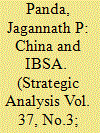

|
|
|
|
|
| Publication |
2013.
|
| Summary/Abstract |
The India-Brazil-South Africa (IBSA) forum, which was formalised in June 2003 through the adoption of the Brasilia Declaration based on the spirit of South-South solidarity, turns a decade old in 2013. The event will be celebrated at its first decadal summit in New Delhi. At the same time, this event needs to be juxtaposed with the fifth consecutive leadership summit of Brazil-Russia-India-China-South Africa (BRICS) in Durban in March 2013. Both IBSA and BRICS are in the limelight for their cross-continental politics. It has also been noted that China may have upped the ante against India by bringing South Africa into BRICS to demote IBSA as a multilateral organisation.
|
|
|
|
|
|
|
|
|
|
|
|
|
|
|
|
| 3 |
ID:
093348


|
|
|
| 4 |
ID:
107220
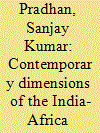

|
|
|
| 5 |
ID:
068718
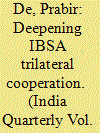

|
|
|
| 6 |
ID:
138396


|
|
|
|
|
| Summary/Abstract |
There are three main factors that have affected Indian energy sectors in the last few decades – the weather effect, rising affluence of the society and rising import prices of the oil supplies. The Indian economy has grown at a steady pace in the recent past but oil has somehow remained synonymous with energy resources.
|
|
|
|
|
|
|
|
|
|
|
|
|
|
|
|
| 7 |
ID:
123530
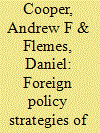

|
|
|
|
|
| Publication |
2013.
|
| Summary/Abstract |
This Introductory Review examines the major debates concerning the rise of emerging powers in the global system. It points to the fundamental difference between the contours of ascendancy in the first quarter of the twenty-first century from previous historical eras with reference to the number of countries placed in this category, the privileging of economic dimensions of power, and the much more elaborate and open levels with regard to institutionalization. Ample attention is paid to the BRICS, but consistent with the image of multipolarity, it also gives some emphasis to the question of whether the changing global system provides enhanced space for middle powers. After highlighting these highly relevant contextual considerations, the core of the Review moves to an analysis centred on more specific puzzles about the foreign policy strategies of emerging powers. One major puzzle is whether the preference of rising states is to work through established institutions or to utilize parallel and/or competitive mechanisms. Another concerns the balance between material interests, status-enhancement, and identity issues as motivators for policy preferences. Still another focuses on the degree to which China should be differentiated from the other BRICS, or indeed whether the BRICS share values such as a common politics of resentment or want to differentiate themselves on a normative-oriented basis in alterative groupings such as IBSA. A more sophisticated awareness of the limitations as well as of the capacities of the BRICS - with an appreciation of the intricate mix of concerns about solidarity and sovereignty, as well as conceptual tensions between realism and complex interdependence - is not only important for assessing the future trajectory of the BRICS role in the world, but in locating space for categories of countries such as middle powers. The major puzzle for middle powers is whether or not they will be able to mobilize attributes, notably the leveraging of 'network power', that provide them with comparative advantage. Although in overall terms the global system has not progressed towards multipolarity in a linear fashion underwritten by alternative actors, it is precisely due to this imprecision - and level of academic and operational contestation - that the articles assembled in this Special Issue have such salience.
|
|
|
|
|
|
|
|
|
|
|
|
|
|
|
|
| 8 |
ID:
107434


|
|
|
|
|
| Publication |
2011.
|
| Summary/Abstract |
Independent India's multilateral strategy was designed defensively as a means to provide the country with some leeway in an intensely competitive bipolar world. Today, India casts itself as an emerging power intent on exerting the bilateral and multilateral influence that the country's founding leaders had long aspired to. Obsolete frameworks such as nonalignment and developing world leadership have mostly been jettisoned in the process. However, questions remain about India's willingness and capacity to take on global responsibilities to match its global aspirations. This article traces the evolution of India's multilateral approach and examinest is multilateral stance through several prisms: the UN Security Council, the World Trade Organization, global climate change negotiations, and some emerging international groupings of states in which India plays a role. Among our conclusions is that, in India's diplomacy, much depends on domestic factors.
|
|
|
|
|
|
|
|
|
|
|
|
|
|
|
|
| 9 |
ID:
131279


|
|
|
| 10 |
ID:
093347
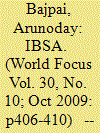

|
|
|
| 11 |
ID:
083589


|
|
|
|
|
| Publication |
2008.
|
| Summary/Abstract |
The formation of the India-Brazil-South Africa (IBSA) Dialogue Forum signals a new phase in South-South cooperation. This paper argues that the IBSA represents the partnership of three like-minded democratic countries, predominant in their respective regions, with some common agenda for the future. The paper argues that the IBSA partnership is still in its formative years and the best is yet to come. There is a need for intense consultation and communication to fructify the goals of IBSA. The paper suggests that the IBSA partners need to build on the successes achieved to date and recognize the fact that there will be significant challenges along the way.
|
|
|
|
|
|
|
|
|
|
|
|
|
|
|
|
| 12 |
ID:
062114


|
|
|
|
|
| Publication |
Jan-Mar 2005.
|
|
|
|
|
|
|
|
|
|
|
|
|
|
|
|
| 13 |
ID:
108963
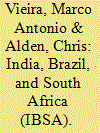

|
|
|
|
|
| Publication |
2011.
|
| Summary/Abstract |
This article argues that the long-term sustainability of the trilateral partnership established in 2003 between India, Brazil, and South Africa (IBSA) rests on a more conscious engagement with their regional partners. The construction of a strong regional leadership role for IBSA based on its members' strategic positions in South Asia, South America, and southern Africa is the proper common ground to legitimize a diplomatic partnership between the IBSA states. This is even more pressing as China is actively competing for markets and influence with the IBSA trio within their respective regions, particularly in Africa. The paradox, though, is that while Northern powers have welcomed the regional leadership role of IBSA's members, most of their neighbors are not convinced of the actual intentions of New Delhi, Brasilia, and Pretoria. As a result, leadership within IBSA is defined in global terms as a claim to lead the developing world. At the regional level, however, IBSA's claim for leadership is less clear, less acceptable, and therefore remains constrained.
|
|
|
|
|
|
|
|
|
|
|
|
|
|
|
|
| 14 |
ID:
093340
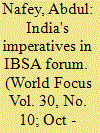

|
|
|
| 15 |
ID:
169350
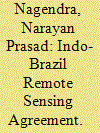

|
|
|
|
|
| Summary/Abstract |
Capabilities in space technology are turning into a corner stone of emergence of developing countries such as India and China. In a string of agreements for cooperation in outer space, India has developed several cooperation mechanisms with international partners to harness the benefits of space technology for mutual benefits. India has recently signed a multitude of cooperative agreements in outer space and these instruments of cooperation have advanced the space based capabilities and have mutually benefitted the partners. In one such recent engagement, India has signed a bilateral cooperation Memorandum of Understanding with Brazil in the implementation of an arrangement establishing cooperation in the augmentation of a Brazilian Earth station for receiving and processing the data from Indian Remote Sensing satellite. The agreement has been based on the interest of Brazil to receive the Resourcesat-2 data for natural resources management, but not limited to it. In the backdrop of the agreement between India and Brazil, the present work presents an analysis of the state of capacities for these countries and an overview of policy implications for India. In a foreign policy perspective, the Indo-Brazil agreement has been timed at a stage when the Sino-Brazil cooperation is faced with a challenge of recent failure and is set to provide India a push into a better South–South cooperation. The agreement has provided India an added location to downlink its satellite data and may well lay a foundation for future cooperation with other Latin American States and for further global strengthening of ties in forums such as the IBSA.
|
|
|
|
|
|
|
|
|
|
|
|
|
|
|
|
| 16 |
ID:
079687
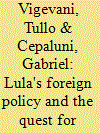

|
|
|
|
|
| Publication |
2007.
|
| Summary/Abstract |
The objective of this article is to analyse the changes brought about by the foreign policy of Lula's first administration (2003 - 06). To discuss the topic, we will make use of three notions: autonomy through distance, autonomy through participation and autonomy through diversification. These notions explain the main changes occurring in Brazilian foreign policy from 1980 to the mid-2000s. We will conclude by demonstrating how the autonomy through diversification notion best applies to the 2003 - 06 period
|
|
|
|
|
|
|
|
|
|
|
|
|
|
|
|
| 17 |
ID:
123534


|
|
|
|
|
| Publication |
2013.
|
| Summary/Abstract |
The multipolarity of the 21st century is fundamentally different from that of its harbingers because in the past decade change and innovation have been induced through sites of negotiation and by the establishment of intergovernmental foreign policy networks. New powers like Brazil, China and India have gained relative weight thanks to their status as agenda setters, brokers and coalition builders. This paper examines the relevance of different foreign policy networks such as India-Brazil-South Africa ( ibsa ) and Brazil-South Africa-India-China ( basic ) for their strategic approaches and argues that they are crucial vehicles for their ascension. Drawing on the work of Hafner-Burton et al, who raised the question of how states increase their power by enhancing their network positions, a typology of foreign policy networks is proposed: mediation, advocacy and substitution networks play important roles in today's shifting global order. The paper analyses how the different network types work together and how particular states have adapted better to the new environment than others.
|
|
|
|
|
|
|
|
|
|
|
|
|
|
|
|
| 18 |
ID:
144259
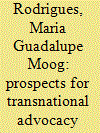

|
|
|
|
|
| Summary/Abstract |
The literature on transnational advocacy networks (TANs) suggests that they may be a valid option for activists in India, Brazil and South Africa (the members of the IBSA bloc) to coordinate efforts to influence their states’ foreign policy. Since its formation the IBSA bloc has formalised spaces for networking among governmental officials, business interests and academics. Yet there are no examples of TANs whose activism has occurred across IBSA, with the purpose of influencing the bloc’s policies. This case study of the challenges that Brazilian advocacy groups face in forging TANs with like-minded groups across IBSA sheds light on the challenges confronting activists and suggests ways of overcoming them.
|
|
|
|
|
|
|
|
|
|
|
|
|
|
|
|
| 19 |
ID:
081486


|
|
|
| 20 |
ID:
107269
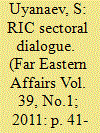

|
|
|
|
|
| Publication |
2011.
|
| Summary/Abstract |
The author gives his view on the specifics of the current stage in the sectoral dialogue developing between Russia, India, and China through tripartite cooperation in practical areas such as business and economics. He analyzes further advance in RIC sectoral interaction against the background of processes evolving in other similar international formats, above all in IB SA - India, Brazil, and South Africa.
|
|
|
|
|
|
|
|
|
|
|
|
|
|
|
|
|
|
|
|
|